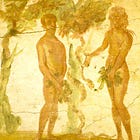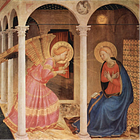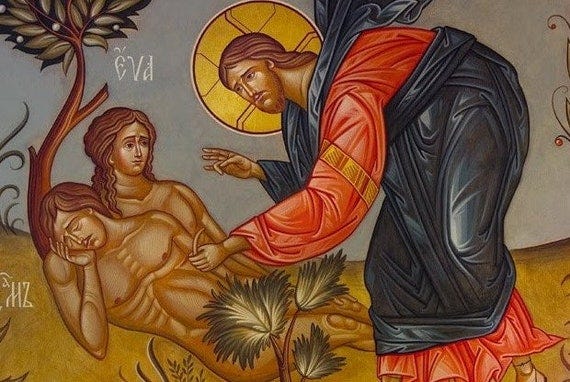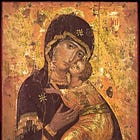Do you see how it says
So God created man in his own image, in the image of God created he him; male and female created he them?
The statement is ambiguous even in Hebrew since it might equally well mean two things.
It might mean that humanity was made in the image of God and humanity, as such, originally combined the elements that would later be separated as what we call “man” and “woman” today. In other words, men1 were created male-female—neither one or the other in actuality, but both. Alternatively, that “God created man in his own image, in the image of God created he him; male and female created he them” might mean that men and women were created from the very beginning through polarization into one or the other of these valences.2
We read in the following chapter of Genesis of the creation of Eve from the rib of Adam. While this narrative still bears either interpretation, it seems abundantly clear that “Adam” before Eve bore something in him that had been separated from “Adam” after the partition. The “anterior unity” interpretation hearkens, of course, to Aristophanes’ myth in Plato’s Symposium about the original androgyne whom the gods themselves began to fear and envy. As a solution, Zeus opted to cleave them into the familiar sexes of today with the thunderbolt:
The primeval man was round…
Terrible was their might and strength, and the thoughts of their hearts were great, and they made an attack upon the gods…
At last, after a good deal of reflection, Zeus discovered a way. He said: “Methinks I have a plan which will humble their pride and improve their manners; men shall continue to exist, but I will cut them in two and then they will be diminished in strength and increased in numbers; this will have the advantage of making them more profitable to us. They shall walk upright on two legs, and if they continue insolent and will not be quiet, I will split them again and they shall hop about on a single leg.” He spoke and cut men in two, like a sorb-apple which is halved for pickling, or as you might divide an egg with a hair….3
The notion of an original unity of what later appears differentiated as the familiar sexes of today is actually suggested by the word itself, since sex is the same root as “section” or “segment” or “sectarian” and more or less means “to part” or “to sunder” or “to divide.”
We can begin to shed light on the doctrine of “Original Sin” if we conceive of how, from an undivided state, the original Adam was polarized into masculine and feminine aspects which were embodied in latter Adam—which, recall, is not the same as Adam before the polarization—and Eve, respectively, and the pattern is propagated, in turn, down the generations to follow them. To begin to understand the nature of this polarization, consider that animals do not possess a comparable psychic individuation of intellect and will as something distinct from feeling and desire. As long as reason and emotion are not two, sin is inconceivable because there exists no standard against which to judge an action that is separate from the will that impelled it. No one calls a rabbit “sinful,” except by equivocation or analogy, for infidelity.
The relationships indicated above disclose the logic as to why it was necessarily Eve who took the apple but Adam, foremost, who sinned since it is the emotional life makes that makes bids for the attention of the mind, which judges them. The dynamics of the emotional life are themselves just what they are and cannot, therefore, be essentially sinful. On top of this, the proper emotional response to one situation is an improper one to another. As Aristotle illustrates:
That is why it is so hard to be good…anybody can get angry—that is easy—and anybody can give or spend money, but to give it to the right person and to give the right amount of it at the right time, for the right cause and in the right way, this is not easy.4
He then elaborates:
Again, we feel anger and fear without choice, but the virtues are modes of choice or involve choice. Further, in respect of the passions we are said to be moved, but in respect of the virtues and the vices we are said not to be moved but to be disposed in a particular way.
The moral dimension of emotion does unfolds in emotion alone, but only in relationship to something outside of emotion. Specifically, in this case, the moral dimension of the soul unfolds in the relation that the rational faculty assumes towards the bids of the emotional one. That is why, in the Genesis account, the LORD appears to rebuke the pair only after Adam consented to Eve’s bid that he taste of the fruit whereas, as the LORD, presumably he could have appeared at any time before that.5
But this was already Adam’s second fault after first allowing Eve to be seduced by Satan. For us, this scenario illustrates an improper ordering of the soul in which intellect and will fail to take responsibility for the care of the emotional life. Aristotle, again, presents a conceptualization of ethics as the practice of giving form and order to one’s psychology through habituation to adequate responses:
Virtue, then, being of two kinds, intellectual and moral, intellectual virtue in the main owes both its birth and its growth to teaching (for which reason it requires experience and time), while moral virtue comes about as a result of habit, whence also its name (ethike) is one that is formed by a slight variation from the word ethos (“habit”).
Note that Eve and Adam, whoever they were in life, are also symbols and embodiments of these archetypal dynamics that are everywhere present to us today, if we have eyes to see them. If Adam and Eve were like men and women of today, then presumably every “Eve” has an Adam in herself and every “Adam” an Eve. The “brothers” Cain and Abel illustrate this, to some extent, since they are conceived as respectively masculine towards the passive narrator. At the same time, every created thing is axiomatically feminine in respect to God while still remaining masculine in respect to chaos or non-being. Applied in the context presently under question, both men and women possess faculties of passion and faculties of judgment, and the proper relationship between them is the one that has been outlined—one of love and submission towards what is higher and love and responsibility towards what is lower.6
Let it again be emphasized that, while the intellect is masculine in respect to the emotions, it is feminine in respect to the principles of reality—the λόγος—and the idea of the Good, and God, and must accordingly submit itself to these things if it is to serve its proper function. This is illustrated in the iconic scene recounted in Genesis in which Adam gives names to the animals:
19And out of the ground the LORD God formed every beast of the field, and every fowl of the air; and brought them unto Adam to see what he would call them: and whatsoever Adam called every living creature, that was the name thereof. 20And Adam gave names to all cattle, and to the fowl of the air, and to every beast of the field; but for Adam there was not found an help meet for him.
This event, of course, transpires immediately prior to the creation of Eve from Adam’s rib. In other words, when “Adam gives names to the animals,” it really means that “Adam-Eve gave names to them.” “Adam,” in this context, refers to the speaking, or activity, and Eve refers to the listening, or receptivity, that was necessarily prior to speaking as a condition to know what to say. Hence, it can be seen that Adam and Eve belong together not in competition but in the synergy which has traditionally been called the hieros gamos (ἱερός γάμος), or “Sacred Marriage” and which was realized in Jesus Christ through his simultaneous union of absolute submission to God and absolute lordship towards Life.7
The integration of speaking and listening—representing activity and receptivity, respectively—is perfectly demonstrates in Jesus injunction to his disciples vis-à-vis the ideal mode of speech:
19But when they deliver you up, take no thought how or what ye shall speak: for it shall be given you in that same hour what ye shall speak. 20For it is not ye that speak, but the Spirit of your Father which speaketh in you.
Of course, the confusion of tongues described the Genesis narrative following the collapse of the Tower of Babel8 renders it nearly impossible to achieve this ideal integration of activity and receptivity today—
the perfect speech was broke and tattered,
so scarcely anything that mattered
anymore could men pronounce or understand
as my upcoming Whitsunday sonnet attempts to convey the situation—because we don’t know how to listen to the Word behind the word, “the Spirit of your Father,” and, as a result, are left largely bereft of perfect communication. But the spirit of Pentecost is a symbol of hope that this communion of souls may one day be restored and all Creation may once again become an open book, and be read as “the First Testament” of God. As Coleridge imagined:
Then will the other great Bible of God, the Book of Nature, become transparent to us, when we regard the forms of matter as words, as symbols, valuable only as being the expression, an unrolled but yet a glorious fragment, of the wisdom of the Supreme Being.9
But let us return to the question of Adam and Eve. Most essentially and directly, Adam loves his wife and wishes her happiness. Out of this love and this wish for Eve, he assumes responsibility to guard her from the Adversary. Adam should have been like the clear sky that receives and transmits the love of God to a tender plant, which rejoices to flower in his presence. As Wisdom sayeth, and
I was daily his delight, rejoicing always before him10
Instead, Adam was, as it were, like the Moon. Adam should have cleaved to God and also to his wife, as an integral link in the scala naturae, or so-called “Great Chain of Being”:
behold a ladder set up on the earth, and the top of it reached to heaven: and behold the angels of God ascending and descending on it.11
If Adam had been a better Eve towards God, he would have been a better Adam towards her.
probably common knowledge, but in traditional English usage, “man” and “men” referred to human beings in their singular and plurals, respectively, without regard to sex. Old English used wer (as in “were-wolf,” which is, “man-wolf”) and wif (as in “wife”—presumably, a female werewolf, if there ever could be such a thing, would have been called a “wifwolf”) to distinguish the sexes, but wer began to disappear late 13c. and was replaced by man, which shares a common root with Sanskrit manas, Latin mens, and English “mind.”
Regrettably, most people who read the Bible today have themselves been steeped in post-Enlightenment attitudes that incline them to treat its descriptions as brute facts and are therefore liable to maintain fundamentalist interpretations that strip these stories of all nuance, subtlety, and depth. Conversely, many who people might otherwise be open to more inspired readings are repelled from the Bible altogether by their own ideological commitments and political allegiances.
the relevant excerpt from Plato’s Symposium, reproduced below, is too funny not to quote in full:
The primeval man was round, his back and sides forming a circle; and he had four hands and four feet, one head with two faces, looking opposite ways, set on a round neck and precisely alike; also four ears, two privy members, and the remainder to correspond. He could walk upright as men now do, backwards or forwards as he pleased, and he could also roll over and over at a great pace, turning on his four hands and four feet, eight in all, like tumblers going over and over with their legs in the air; this was when he wanted to run fast. Now the sexes were three, and such as I have described them; because the sun, moon, and earth are three; and the man was originally the child of the sun, the woman of the earth, and the man-woman of the moon, which is made up of sun and earth, and they were all round and moved round and round like their parents. Terrible was their might and strength, and the thoughts of their hearts were great, and they made an attack upon the gods; of them is told the tale of Otys and Ephialtes who, as Homer says, dared to scale heaven, and would have laid hands upon the gods. Doubt reigned in the celestial councils. Should they kill them and annihilate the race with thunderbolts, as they had done the giants, then there would be an end of the sacrifices and worship which men offered to them; but, on the other hand, the gods could not suffer their insolence to be unrestrained. At last, after a good deal of reflection, Zeus discovered a way. He said: 'Methinks I have a plan which will humble their pride and improve their manners; men shall continue to exist, but I will cut them in two and then they will be diminished in strength and increased in numbers; this will have the advantage of making them more profitable to us. They shall walk upright on two legs, and if they continue insolent and will not be quiet, I will split them again and they shall hop about on a single leg.' He spoke and cut men in two, like a sorb-apple which is halved for pickling, or as you might divide an egg with a hair; and as he cut them one after another, he bade Apollo give the face and the half of the neck a turn in order that the man might contemplate the section of himself: he would thus learn a lesson of humility. Apollo was also bidden to heal their wounds and compose their forms. So he gave a turn to the face and pulled the skin from the sides all over that which in our language is called the belly, like the purses which draw in, and he made one mouth at the centre, which he fastened in a knot (the same which is called the navel); he also moulded the breast and took out most of the wrinkles, much as a shoemaker might smooth leather upon a last; he left a few, however, in the region of the belly and navel, as a memorial of the primeval state. After the division the two parts of man, each desiring his other half, came together, and throwing their arms about one another, entwined in mutual embraces, longing to grow into one, they were on the point of dying from hunger and self-neglect, because they did not like to do anything apart; and when one of the halves died and the other survived, the survivor sought another mate, man or woman as we call them,—being the sections of entire men or women,—and clung to that. They were being destroyed, when Zeus in pity of them invented a new plan: he turned the parts of generation round to the front, for this had not been always their position, and they sowed the seed no longer as hitherto like grasshoppers in the ground, but in one another; and after the transposition the male generated in the female in order that by the mutual embraces of man and woman they might breed, and the race might continue; or if man came to man they might be satisfied, and rest, and go their ways to the business of life: so ancient is the desire of one another which is implanted in us, reuniting our original nature, making one of two, and healing the state of man.
Aristotle, Nicomachean Ethics
Cf. Genesis 3
And God said, Let us make man in our image, after our likeness: and let them have dominion over the fish of the sea, and over the fowl of the air, and over the cattle, and over all the earth, and over every creeping thing that creepeth upon the earth.
—Genesis 1:26 (KJV)
It is said that a book is a mirror for the soul. It is said, moreover, that for someone who lacks the ability for understanding, a book will be of no more use than is a mirror to a blindman. Concerning the notorious “dominion clause” in Genesis quoted above: people who interpret “dominion” as “domination” inadvertently reveal more about themselves than the text. They are seeing their own image in the book’s pages. “Dominion” literally means “lordship” or “rulership.” Traditionally, the hierarchy implicit in lordship entailed the obligation for stewardship and care. A father must have dominion over his young child for the latter’s sake. This hierarchical relationship is perhaps most supremely illustrated in the iconic scene following the “Last Supper” in chapter thirteen of the Gospel of John in which Jesus washes the disciples’ feet:
4 He riseth from supper, and laid aside his garments; and took a towel, and girded himself.
5 After that he poureth water into a bason, and began to wash the disciples' feet, and to wipe them with the towel wherewith he was girded.
…
12 So after he had washed their feet, and had taken his garments, and was set down again, he said unto them, Know ye what I have done to you?
13 Ye call me Master and Lord: and ye say well; for so I am.
14 If I then, your Lord and Master, have washed your feet; ye also ought to wash one another's feet.
15 For I have given you an example, that ye should do as I have done to you.
Christ came to show humanity what “lordship” or “dominion” really means. As the Master sayeth, “And he that taketh not his cross, and followeth after me, is not worthy of me.”2
Plato’s Republic dialogue explores a similar theme in one of the early exchanges in which Socrates attempts a painstaking refutation of Thrasymachus’ attempt to reduce hierarchy to oppression. As a doctor plies his art for the sake of his patient and not for his own sake, Socrates argues, so the ruler governs for the sake of his subjects. “But the doctor actually works for money and not for the sake of his patients’ health” is Thrasymachus’s rejoinder, indicating that Socrates is naïve. Certainly, a doctor might be less obliged to clock in if he were not compensated for his work, but insofar as he is allowing pecuniary considerations to inform his action, he is acting as something other than a doctor. Put another way, a doctor is only measured by his actual orientation towards the health of his patients. If there were a doctor who refrained from healing his patients out of protest or for the sake of going fishing, he would not be a doctor at all, but a protestor or a fishmonger. Similarly, the ruler who governs for anything other than the sake of his subjects and the welfare of the state is serving in an ulterior office and thus should not be regarded as a ruler altogether.
I believe that a misinterpretation of Genesis is something of a sign in the times. The difficulty that besets contemporary people when they are tasked with interpreting the “dominion clause” is likely a function of the essentially revolutionary and, to some extent, Marxist ethos of modern Liberalism. “Lordship” carries with it, in contemporary ears, the connotation of oppression, or at least, an infringement on the consent of the governed, property rights, equality, separation of church and state, individual liberty, etc. In this way, the basic philosophical and political atmosphere that we are born into and ordinarily never notice as such seems to instill in us the proclivity to interpret Genesis’ “dominion” as “domination,” which is to say, “oppression” or “subjugation.” We tend to equate liberty with license and imagine the tyrant is the only sort of king. Naturally, history has shown that not every king is not a tyrant, but to assert that the overthrow of any hierarchy to usher in the Communist utopia is no less one-sided and often leads to worse outcomes for everyone involved.
Returning to Genesis: in essence, Adam was supposed to be the priest of Creation, which is to say, the intermediary between Heaven and Earth. Christ came to accomplish what Adam failed to do and show us the true meaning of lordship. The higher and the lower are bound in a hierarchy through love. This love, when descending the hierarchy from above appears as care, responsibility, oversight, and service, and rising up the hierarchy from below as respect, submission, and loyalty.
It is quite extraordinary to behold how the archetype behind the story of Eve is perfectly reversed in respect to the Mary at the Annunciation: the image of Mary receiving the fruit inwardly is a clear peripeteia or “reversal,” of the image of Eve seizing the fruit from without. Eve’s action brought about the fall into duality while Mary’s passion gave birth to the one who resolves it.
Eva is an anagram, reversal, and “turning” of Ave, which were the words of the Archangel at the Annunciation.
Therefore is the name of it called Babel; because the LORD did there confound the language of all the earth: and from thence did the LORD scatter them abroad upon the face of all the earth. (Genesis 11:9)
Coleridge, Philosophical Lectures of 1818, 'lecture xii.
Proverbs 8:30
Genesis 28:12










Hi Max,
I am reminded of my comment back on December 28, 2023, with the first installment of Adam and Eve:
https://open.substack.com/pub/theoriapress/p/adam-and-eve-e03?r=2kbdzg&utm_campaign=comment-list-share-cta&utm_medium=web&comments=true&commentId=46200304
Now, you bring the citation up here, Genesis 1 vs. 26-31, and it seems more clear than ever. God must create Man first as male-female, i.e., androgynous, but the actual separation takes place with the Lord God of actualization, beginning in Genesis 2:4. This is all part of the "image" and "likeness" dichotomy that God also foresees in the first six/seven days. Thus, Eve's temporal creation from the rib of Adam is necessary for sexual differentiation. It establishes the basis for the procreative Generations of Adam and Eve, which begins in Genesis 5.
I am reminded also that Steiner indicated in a number of places that a man has a female etheric body, and a woman has a male etheric body. And, if we consider the little recognized fact that Elijah, the Hebrew Folk Soul, had a comrade in Elisha, who demanded full responsibility for the furtherance of the task for the Hebrews, including the leather belt, we would better see that a male-female aspect is involved here in the Hebrew migration.
Adam & Eve in the Garden of Indestructible Light
http://beezone.com/adida/adidajesus/adamnervoussystemeveflesh.html